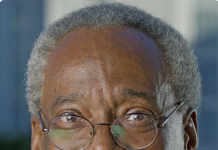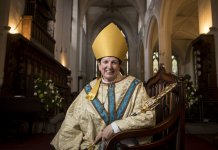The chaplain of St Andrew’s, Moscow, Revd Canon Malcolm Rogers, has criticised the UK government’s decision to impose sanctions on the head of the Russian Orthodox Church, Patriarch Kirill, for his support of Russia’s military aggression in Ukraine.
In a letter to The Times newspaper, Revd Malcolm described the move as ‘one of the more foolish responses to the conflict in Ukraine’ and he warned it would have a negative impact.
‘While the UK government may wish to express its rejection of the support given to the conflict by the Patriarch by imposing sanctions on him, the UK is playing into the narrative that the conflict in Ukraine is a defensive fight for the survival of Russia against expansionist western forces…,’ he says in the letter. ‘Unfortunately, this is being portrayed here in Moscow as a UK attack on Russian culture and people, and another reason to justify sending soldiers into Ukraine.’
Bishop Robert stressed the need for the Church to keep all channels of communication open in the pursuit of a peaceful end to the conflict.
The government announced the sanctions last week. The EU discussed imposing sanctions against Patriarch Kirill but backed down after objections from Hungary.
Revd Malcolm’s letter comes at the same time as a major statement on the war in Ukraine by the central committee of the World Council of Churches. The statement was drafted by a sub-committee which included Bishop Robert and representatives of the Russian Orthodox Church. In it, the WCC deplored what it called the illegal and unjustifiable war inflicted on the people of Ukraine and the resulting toll of death, destruction, instability and risk of famine.
The statement reiterated the WCC’s appeal for an immediate ceasefire and for dialogue and negotiations to secure a sustainable peace. It also called on the international community to invest more in the search for peace rather than escalating confrontation and division.
The WCC also rejected the misuse of religious language and authority to justify armed aggression but noted the commitment of the Moscow Patriarchate to engage in dialogue on the situation in Ukraine.
The incoming General Secretary, Revd Prof Dr Jerry Pillay, dismissed any suggestion that Patriarch Kirill’s comments could lead to suspension of the Russian Orthodox Church from the WCC.
‘The WCC would advocate dialogue, conversations,’ he told a journalist. ‘We need the Patriarch; we need the Russian Orthodox Church with us in these conversations; and we can’t have them without them. ‘So, suspension is not on the cards at the moment, especially if we advocated things like dialogue.’










